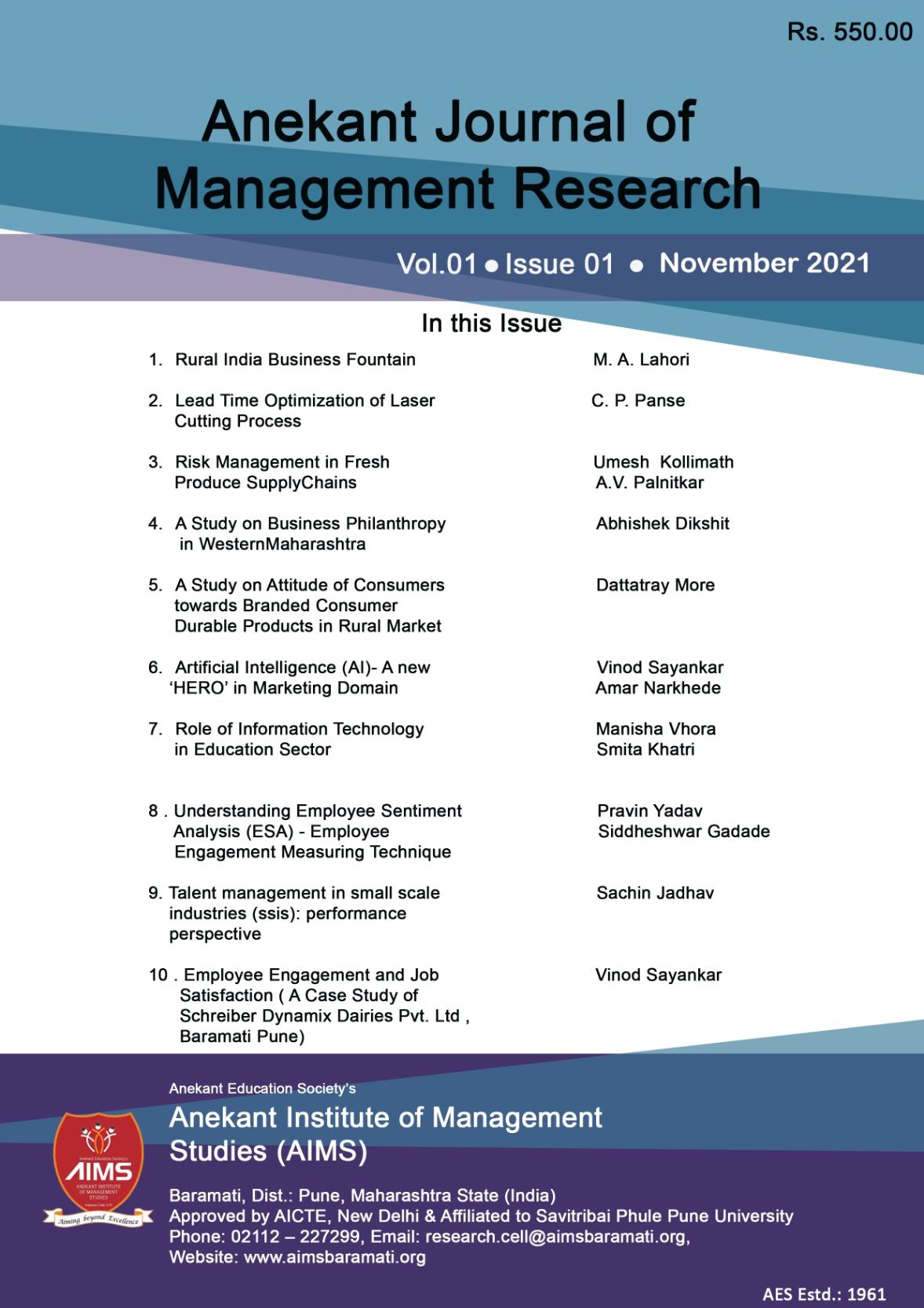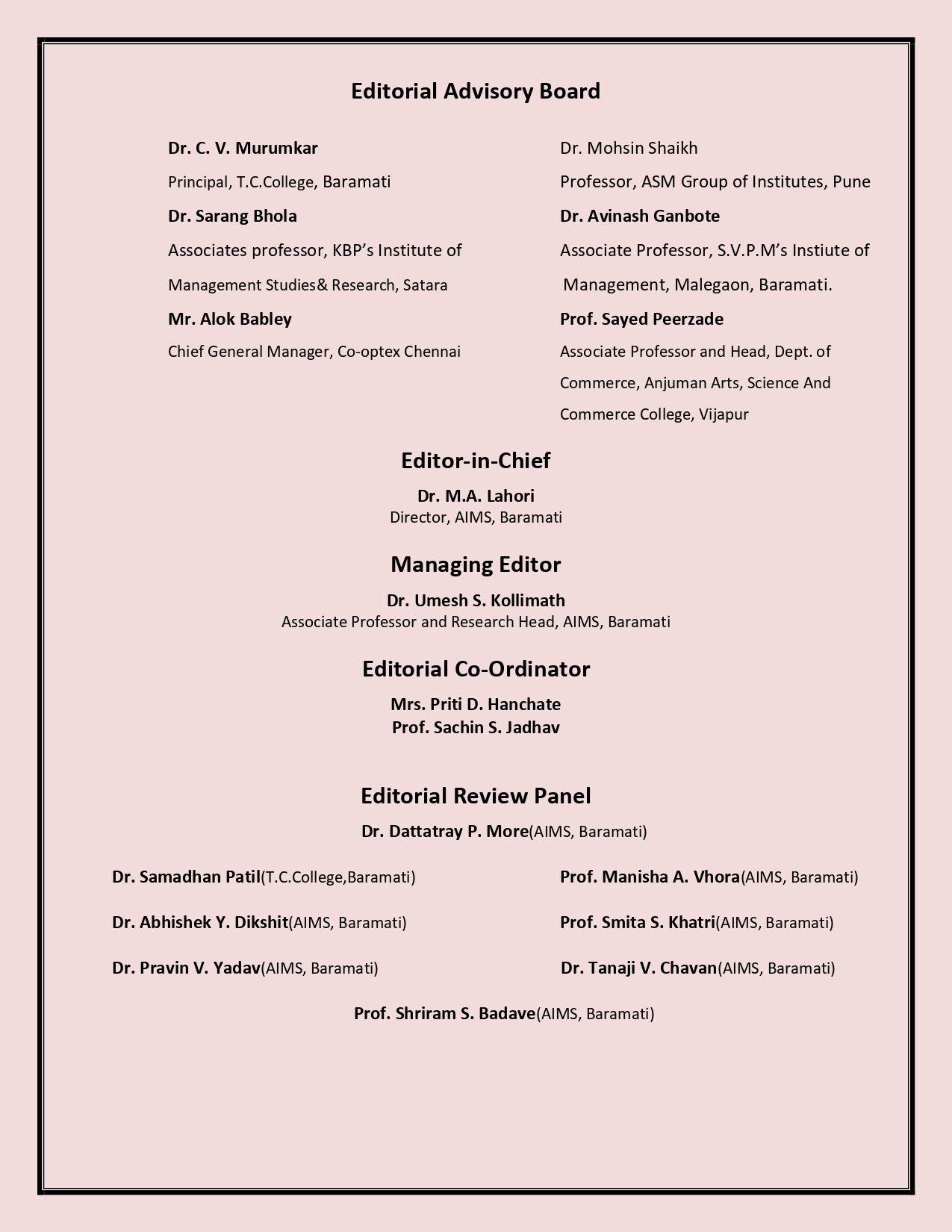Research Innovations & Extension
Driving academic excellence through research, innovation, and extension activities.

Preamble
In higher education, Research and Innovation creates an integrated base for various activities of an institution. Ideally all research activities designed to address:
- Demand
- Diversification of resources
- Dynamic and lifelong learning needs; and
- Leveraging Information Communication Technology (ICT)
to enhance networking and social engagement, both with the economic sector and with the community at large.
The success of a Management Institute largely depends upon the alignment of all the faculty members with contemporary research needs. Therefore, the present research policy aims to help Anekant Institute of Management Studies and its faculty to achieve excellence and contribute to skill oriented higher education so as to benefit industry and society.

Objectives
This policy provides a broad framework to guide and ensure integrity of academic research among faculty members and students. The objectives of policy are as follows
- To promote research, innovation and intellectual capital,
- To ensure integrity, quality and ethics in research,
- To integrate teaching and research

Promotion of Research
AIMS believes that to students and faculty must be given freedom to choose the subject of their research, to seek support from any funding source for their research work, and to report their findings and conclusions. However, research out so produced shall be subjected to the scrutiny by the Institute and constructive criticism of peers. Research techniques used by the researchers shall not violate established professional ethics, pertaining to academic research.
The Research Committee and Research Cell is entrusted with the responsibility to create conducive environment for research. The research needs are to be balanced with the available resources, such as funds, space, facilities, and other resources based on the scholarly and educational merits of the proposed research. It shall also provide development opportunities to researchers for writing research proposals and reports, publications, IPRs, etc.

Identification of Thrust Areas
Although the researchers have the freedom to choose their own topics of research, the research committee of AIMS will evaluate all research proposals for their socially relevance. The Research Cell coordinates with different subject teachers to prepare a list of research topics with a view to be focussed in their efforts. Also, the Research Committee continuously interacts with various stakeholders such as student community, academicians, and industry experts in identifying burning issues which need an urgent inquiry. Thus, the research cell keeps on updating its list of research ideas, areas, and topics and shares the same with students and faculty members.

Research Collaborations
- Industry Sponsored Research Project:
The Research Cell looks for industry sponsors and link them with experts of the institution to undertake conduct research on a specific topic for which financial support will come from the company. This will lead to three kinds of benefit:- The researcher will get exposures to the concerned area of research;
- The industry will get solutions to its problem; and,
- The researcher, Institute and Industry can earn money and at the end, the society ultimately will benefit.
- Interdisciplinary Research:
The interdisciplinary research has become necessary to deliver meaningful and precise research output. Therefore, AIMS has decided to facilitate interdisciplinary research activities for which the following steps will be taken:- Identify the interdisciplinary area.
- Identify the different experts from concerned disciplines who can work together.
- Study the requirement of the infrastructure to conduct the concerned interdisciplinary research.
- Explore possibilities to find resources for such interdisciplinary research.

Training for Research and Publications
Besides triggering research temperament, AIMS facilitates sharing of expertise within and among the surrounding institutes of higher learning to write a research papers and channelize their efforts
The Research Cell provides separate and exclusive platform for the students community to showcase their research endeavors and incentivize the same. Research so produced is considered for publication subject to the evaluation.
The Research Cell has also been instrumental in encouraging teaching fraternity across various disciplines to think from the management perspective and write research papers relevant to their field of study.
AIMS, mobilizes and imparts fresh research insights among teachers and students within and outside the Institute by means of its Research Cell.

Publication of Papers and Journals
AIMS consistently hosts conferences to mobilize research efforts from within and outside, among students, teachers, as well as industry. The research cell identifies contemporary issues to be addressed during these conferences.
Further, the research cell connects the opportunities to write, contribute and present research works organized by other institutes. Each faculty member is encouraged to publish his/her Research papers in identified journals and to be presented at national and international conferences.

Patent and IPR
The Institute has a practice of First Week Review Meetings that measure effectiveness and accountability. This is evident through enhanced research publications, active participation in Faculty Development Programs (FDPs) and workshops, registered patents, faculty invitations to lead speakers, resource persons, etc. Total 45 IPR Workshops conducted on Research Methodology, Intellectual Property Rights (IPR) and entrepreneurship.

Research Repository
All significant research works from students and faculty members such as published research papers, doctoral thesis, and books shall be properly made available to all stakeholders to in order to further the research.

Ecosystem for Innovation
The institutional innovation ecosystem is engaged in market surveys, marketing expertise, human capital insights, and other verticals of techno-business and societal outlook. The institute has commissioned an incubation centre and start-up since 2013, catering to the ecosystem needs of Local industrial belts and other nearby areas. Adding a feather to the cap, the institution has an innovation Council on campus as per the norms of the Innovation Cell, Ministry of Education, Government of India in 2021-22.
The research centre’s facilities and activities for the benefit of incubators and students are as follows:
- The institute has a suitable infrastructure and support system for business know-how and incubation activities.
- It has provided training, awareness, and Turn Key Projects to the eight start-up incubators.
- The institute has tangibly extended the loop line for finance, technical know-how, entrepreneurship motivational support, and ideation support for fourteen entrepreneurs.
- The institute teachers have shared their expertise and consultancies in areas like Marketing, HR, and general administration for seven MoU partners.
- The Institute has a research centre for the Ph.D. Program with Six in-house Ph.D. guides approved by the University.
- Consistently organized the national conference (14 conferences in 13 Years) on relevant and contemporary issues and start-up event in management fest (INTAGLIO Series).
- With the funded support and guidance of the research committee, teachers have published 106 papers in CARE-listed journals.
- The signature activity of the Innovation Centre is a skill development workshop with MoU partners in the rural colleges. More than 25 such skill development workshops trained more than 2000 students yearly.
- The Industrial Board of Mentors-Board of Entrepreneurship Development is a paving pathway for innovation cell activities.

Code of Ethics for Research (CER)
AIMS promotes research that benefits to the larger section of society and so the Management Council, Faculty Members and Students of the Institute are committed to research focused on people, organizations and industry. To honour the trust placed in researchers by research participants, funding organisations and society, the researchers should at all times act correctly and in ways that respect the rights and dignity of the participants, organisations and industry. In this regard all faculty members, researchers and students undertaking research are bound by code of research ethics.

Objectives
AIMS lays down Code of Ethics for Research:
- To provide the ethical framework within which the ethical review process will operate across campus
- To promote exemplary ethical standards in research and scholarship

Scope
This document lays down code of research ethics for all faculty members, researchers and students undertaking research and operationally controlled by the AIMS. It covers all the activities through which research information and data are gathered, processed and disseminated including surveys and interviews and the reporting of research findings.
The following are ethical principles that this codes address:
| Academic Honesty | Be honest in all scientific communications. Honestly report data, results, methods and procedures, and publication status. Do not fabricate, falsify, or misrepresent data. Do not deceive colleagues, granting agencies, or the public. |
| Integrity | Keep your promises and agreements; act with sincerity; strive for consistency of thought and action. |
| Carefulness | Avoid careless errors and negligence; carefully and critically examine your work and the work of peers. Keep good records of research activities, such as data collection, research design, and correspondence with agencies or journals. |
| Respect for Intellectual Property | Honour patents, copyrights, and other forms of intellectual property. Do not use unpublished data, methods, or results without permission. Give credit where credit is due. Give proper acknowledgement or credit for all contributions to research. Never plagiarize. |
| Confidentiality | Protect confidential communications, such as papers or grants submitted for publication, personnel records, trade or military secrets, and patient records. |
| Social Responsibility | Strive to promote social good and prevent or mitigate social harms through research, public education, and advocacy. |
| Competence | Maintain and improve professional competence and expertise through lifelong education and learning; take steps to promote competence in science as a whole. |
| Legality | Know and obey governmental policies, relevant laws and institutional rules and regulations. |
| Human Subjects Protection | When conducting research on human subjects, minimize harms and risks and maximize benefits; respect human dignity, privacy, and autonomy; take special precautions with vulnerable populations; and strive to distribute the benefits and burdens of research fairly. |

AIMS Research Cell
| Sr.No. | Name of the Member | Designation |
|---|---|---|
| 1 | Dr. M.A. Lahori | Director |
| 2 | Dr. S. V. Khatavkar | Research Head |
| 3 | Dr. T.V. Chavan | IQAC Head |
| 4 | Dr. D.P. More | Member |
| 5 | Ms. Kshitija Bhosale | Student Member |
| 6 | Mr. Nirmal Raisoni | Student Member |

Programs Conducted on Research, Intellectual Property Rights (IPR) and Entrepreneurship
| Sr. No. | Academic Year | Number of Programs |
|---|---|---|
| 1 | 2022-23 | 14 |
| 2 | 2021-22 | 23 |
| 3 | 2020-21 | 2 |
| 4 | 2019-20 | 3 |
| 5 | 2018-19 | 3 |

Research Papers Published in UGC CARE Listed Journals
| Sr. No. | Academic Year | Number of Programs |
|---|---|---|
| 1 | 2022-23 | 29 |
| 2 | 2021-22 | 22 |
| 3 | 2020-21 | 06 |
| 4 | 2019-20 | 16 |
| 5 | 2018-19 | 12 |

Research Papers, Books, Chapters Published in ISBN
| Sr. No. | Academic Year | Number of Programs |
|---|---|---|
| 1 | 2022-23 | 55 |
| 2 | 2021-22 | 29 |
| 3 | 2020-21 | 16 |
| 4 | 2019-20 | 12 |
| 5 | 2018-19 | 26 |

Ph.D. Research Centre

SPPU Approved Research Guide
| Sr. No. | Guide Name | Board of Studies | Registered Student | Vacant Position |
|---|---|---|---|---|
| 1 | Dr. P. V. Yadav | Human Resource Management | 04 | 00 |
| 2 | Dr. D.P. More | Marketing Management | 06 | 00 |
| 3 | Dr. T.V. Chavan | Financial Management | 04 | 02 |
| 4 | Dr. A. Y. Dikshit | Organisational Management | 00 | 06 |
| 5 | Dr. S. V. Khatavkar | Marketing Management | 00 | 04 |

Resource Mobilization (Grants from Government and Non-Governmental Agencies for Research Projects)
| Sr. No. | Year of Award | Amount Sanctioned (Lakhs) | Name of the Funding Agency |
|---|---|---|---|
| 1 | 2022-23 | 1 | M/s. D’lecta Foods (Pvt.) Ltd., Mumbai |
| 2 | 2021-22 | 0.5 | AICTE |
| 3 | 2020-21 | 1.85 | AICTE |
| 4 | 2019-20 | 2.6 | Savitribai Phule Pune University |
| 5 | 2018-19 | 0.75 | Sakal Foundation |
| Total | 6.7 |

Research Journal

Journal information
Anekant Journal of Management and Research (AJMR) welcomes articles on the issue of current interest in management. We publish Empirical Papers, Conceptual Papers, Research Notes, Case Studies.
Editorial Board

Guidelines for submission
Anekant Journal of Management and Research (AJMR) welcomes articles on the issue of current interest in management. We publish Empirical Papers, Conceptual Papers, Research Notes, Case Studies. All contributions to AJMR Journal will review by two or more referees .Review process takes three or four months and the status would be known after three or four months of submission of article. Manuscript Submission Submission should be typed in Times New Roman font size 12, with 1 line spacing and with a 1-inch margin on all sides. The acceptable lengths for different types of articles published in Anekant Journal of Management and Research (AJMR) are as indicated below:- Research Paper (Empirical or Conceptual): 5000 to 8000 words.
- Case Study or Research Note: 4000 to 6000 words.
Dr. S. V. Khatavkar
Managing Editor
Anekant Journal of Management (AJMR), Baramati
